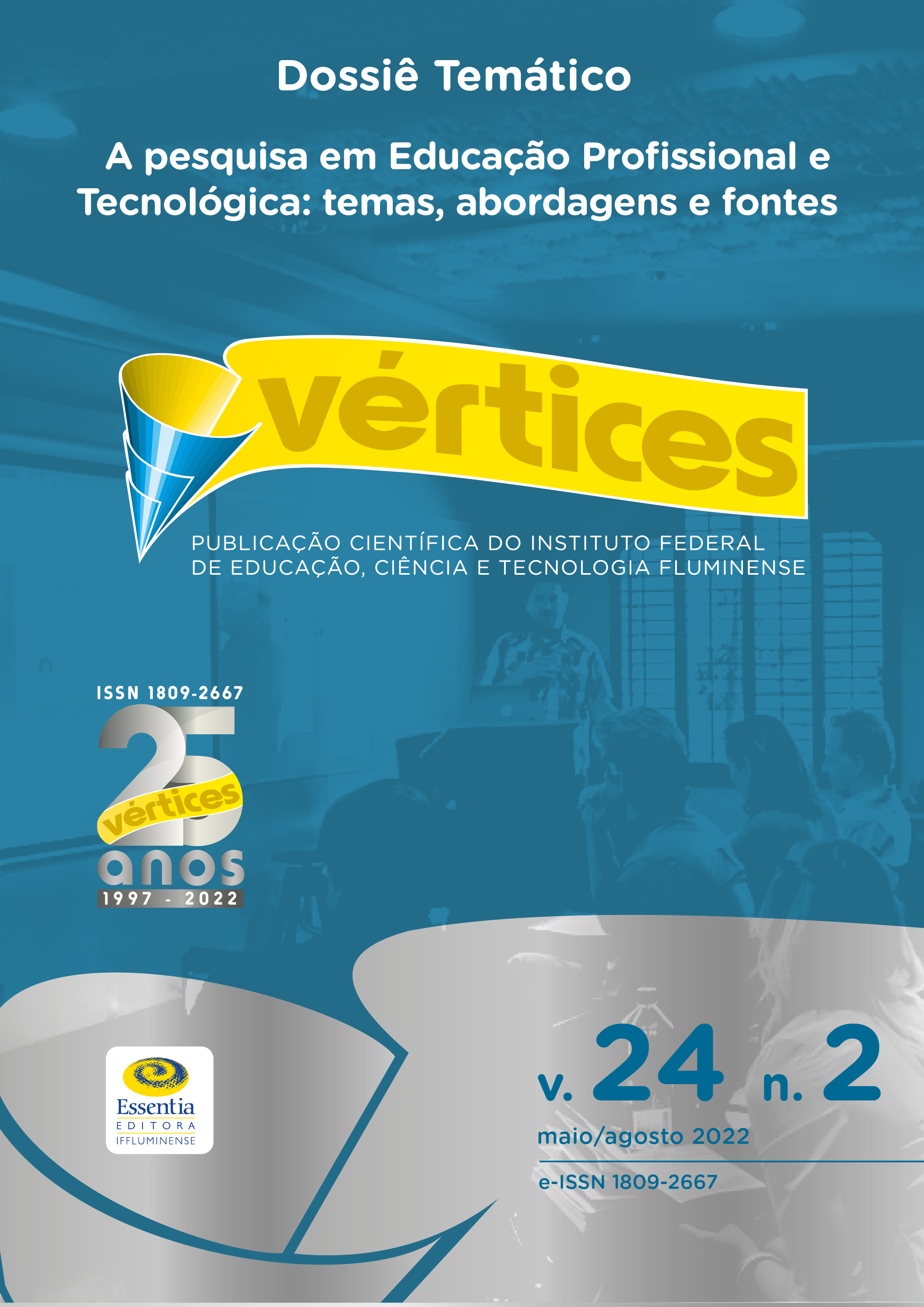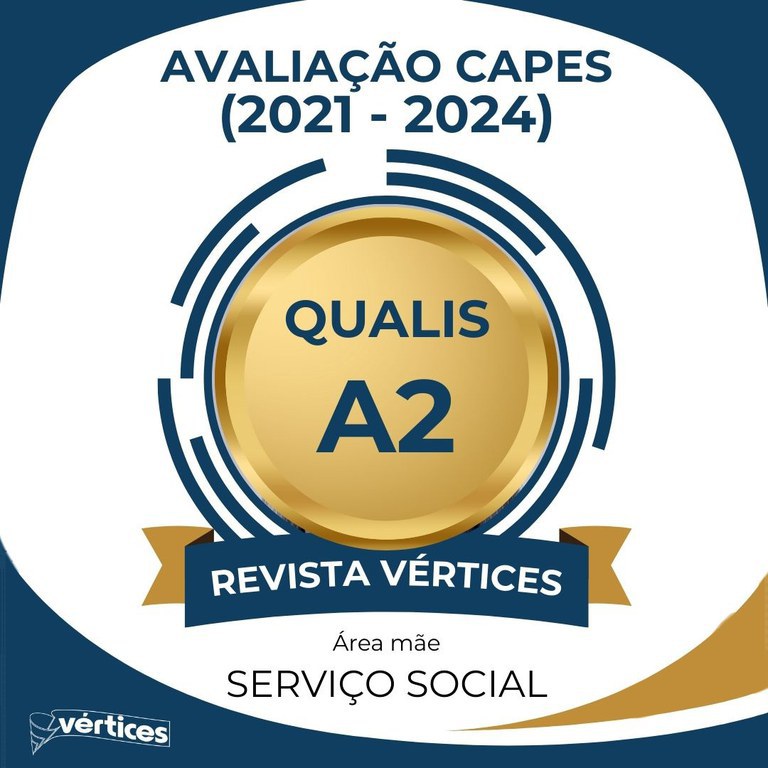High School Education integrated into the “Base Nacional Comum Curricular”: reflections on omnilateral and decolonial Spanish Language education
DOI:
https://doi.org/10.19180/1809-2667.v24n22022p350-370Keywords:
High School Education integrated, Decoloniality, Technical and Vocational Education and Training, BNCC, Spanish LanguageAbstract
This text is the result of discussions promoted in the Conceptual Bases for Technical and Vocational Education and Training. The methodology is characterized as a bibliographical review in which the theoretical contribution is mainly the discussion based on High School Education integrated, on the Base Nacional Comum Curricular - BNCC, in addition to documents that regulate this type of teaching in Brazil, with a focus on teaching additional languages, especially the Spanish language: Curriculum Guidelines for High School, Laws No. 11.161/2005 and No. 13.415/2017. Therefore, this discussion addresses key concepts for the foundation of Integrated Secondary Education, associating them with Decolonial Pedagogy according to the BNCC, as these concepts represent a praxis based on the creation and construction of social, political, cultural conditions of non-hegemonic thought. The analysis reveals the erasure process that, despite the work carried out by the Fica Espanhol Movement and by the Spanish Teachers Associations and by law No. 3.849/19, this language has been suffering since the repeal of Law No. 11.161/2005 by Law No. 13.415/2017, called the Secondary Education Reform Law; otherwise, there is no mention of teaching Spanish at the BNCC.Downloads
References
BARROS, C.; COSTA, E.; GALVÃO, J. (org.). Dez anos da “Lei do Espanhol”: (2005 a 2015). Belo Horizonte: FALE/UFMG, 2016.
BRANCO, E. P. et al. BNCC: a quem interessa o ensino de competências e habilidades?. Debates Em Educação, v. 11, n. 25, p. 155-171, 2019. DOI: https://doi.org/10.28998/2175-6600.2019v11n25p155-171. Disponível em: https://www.seer.ufal.br/index.php/debateseducacao/article/view/7505. Acesso em: 21 jul. 2022.
BRASIL. Ministério da Educação. Plataforma Nilo Peçanha. Disponível em: http://plataformanilopecanha.mec.gov.br/2021.html. Acesso em: 13 nov. 2021.
BRASIL. Ministério da Educação. Base Nacional Comum Curricular. Brasília: MEC, 2018. Disponível em: http://basenacionalcomum.mec.gov.br/images/BNCC_EI_EF_110518_versaofinal_site.pdf. Acesso em: 13 nov. 2021.
BRASIL. Ministério da Educação. Instituto Federal de Educação, Ciência e Tecnologia: um novo modelo em educação profissional e tecnológica- concepção e diretrizes. Brasília, 2010. Disponível em: http://portal.mec.gov.br/dmdocuments/livreto_institutos.pdf. Acesso em: 13 nov. 2021.
BRASIL. Secretaria de Educação Básica. Orientações Curriculares para o Ensino Médio. Brasília: Ministério da Educação, Secretaria de Educação Básica, 2006. v. 1. Disponível em: http://portal.mec.gov.br/seb/arquivos/pdf/book_volume_01_internet.pdf. Acesso em: 17 nov. 2021.
CANDAU, V. M. F. Educación intercultural en América Latina: distintas concepciones y tensiones actuales. Estudios pedagógicos (Valdivia), v. 36, n. 2, p. 333-342, 2010. Disponível em: https://www.scielo.cl/pdf/estped/v36n2/art19.pdf. Acesso em: 24 jul. 2022.
CANDAU, V. M. F. Diferenças culturais, interculturalidade e educação em direitos humanos. Educação & Sociedade, v. 33, n. 18, p. 235-250, 2012. Disponível em: https://www.scielo.br/j/es/a/QL9nWPmwbhP8B4QdN8yt5xg/?format=pdf&lang=pt. Acesso em: 25 jul. 2022.
CANDAU, V. M. F. Cotidiano escolar e práticas interculturais. Cadernos de pesquisa, v. 46, n. 161, p. 802-820, jul./set. 2016. DOI: http://dx.doi.org/10.1590/198053143455. Disponível em: https://www.scielo.br/j/cp/a/GKr96xZ95tpC6shxGzhRDrG/?format=pdf&lang=pt. Acesso em: 25 jul. 2022.
CIAVATTA, M. A formação integrada: a escola e o trabalho como lugares de memória e de identidade. In: FRIGOTTO, G.; CIAVATTA, M.; RAMOS, M. (org.). Ensino Médio Integrado: concepção e contradições. São Paulo: Cortez, 2012. p. 83-106.
DAHER, D. C.; SANT’ANNA, V. L. A. O espanhol nas OCEM. In: BARROS, C.; COSTA, E.; GALVÃO, J. Dez anos da “Lei do Espanhol”: (2005 a 2015). Belo Horizonte: FALE/UFMG, 2016. p. 77-81.
DREIFUSS, R. A. 1964: A conquista do Estado. Petrópolis: Vozes, 1981.
FRIGOTTO, G. Concepções e mudanças no mundo do trabalho e o ensino médio. In: FRIGOTTO, G.; CIAVATTA, M; RAMOS, M. (org.). Ensino Médio Integrado: concepção e contradições. São Paulo: Cortez, 2012. p. 57-82.
FRIGOTTO, G. A polissemia da categoria trabalho e a batalha das ideias nas sociedades de classe. Revista Brasileira de Educação, v. 14, n. 40, jan./abr. 2009. DOI: https://doi.org/10.1590/S1413-24782009000100014. Disponível em: https://www.scielo.br/j/rbedu/a/QFXsLx9gvgFvHTcmfNbQKQL/abstract/?lang=pt. Acesso em: 21 jul. 2022.
GONÇALVES, R. O.; BONFIM, V. S. Jornadas Bolivarianas. 12. ed. Florianópolis, 2017. Disponível em https://iela.ufsc.br/jornadas-bolivarianas/xiii-edicao/anais-da-xiii-edicao-das-jornadas-bolivarianas/jornadas-10. Acesso em: 24 nov. 2021.
GONÇALVES, A. I.; MARCHESAN, M. T. N. Interação e Língua Espanhola Nas Orientações Curriculares para o Ensino Médio. Percursos Linguísticos, [S. l.], v. 7, n. 14, p. 436-454, 2017. Disponível em: https://periodicos.ufes.br/percursos/article/view/15469. Acesso em: 17 nov. 2021.
GRAMSCI, A. Os intelectuais e a organização da cultura. 4. ed. Rio de Janeiro: Civilização Brasileira, 1982.
KANASHIRO, D. S. K.; MIRANDA, A. K. P. Espanhol, presente! Discussão sobre o apagamento e a resistência do idioma em documentos oficiais. TEXTURA-Revista de Educação e Letras, Canoas/RS, v. 22, n. 50, p. 289-308, abr./jun. 2020. DOI: https://doi.org/10.17648/textura-2358-0801-v22n50-5480. Disponível em: http://www.periodicos.ulbra.br/index.php/txra/article/view/5480. Acesso em: 21 jul. 2022.
LEFFA, V. J.; IRALA, V. B. O ensino de outra (s) língua (s) na contemporaneidade: questões conceituais e metodológicas. In: LEFFA, V. J.; IRALA, V. B. (org.). Uma espiadinha na sala de aula: ensinando línguas adicionais no Brasil. Pelotas: Educat, 2014. p. 21-48.
MACHADO, R.; CAMPOS, T. R.; SAUNDERS, M. C. História do Ensino de Línguas no Brasil: Avanços e Retrocessos. Revista HELB, Brasília: Universidade de Brasília, v. 1, n. 1, 2007. Disponível em: http://www.helb.org.br/index.php/revista-helb/ano-1-no-1-12007/98-historia-do-ensino-de-linguas-no-brasil-avancos-e-retrocessos. Acesso em: 16 nov. 2021.
MALDONADO-TORRES, N. Sobre la colonialidad del ser: contribuciones al desarrollo de un concepto. In: CASTRO-GÓMEZ, S.; GROSFOGUEL, R. (org.) El giro decolonial: reflexiones para una diversidad epistémica más allá del capitalismo global. Bogotá: Universidad Javeriana-Instituto Pensar, Universidad Central-IESCO, Siglo del Hombre Editores, 2007. p. 127-167.
MARX, Karl. O capital. São Paulo: Abril Cultural, 1983. v. 1.
MATOS, D. C. S. Linguística Aplicada e o SULear: práticas decoloniais na educação linguística em espanhol. Revista Interdisciplinar Sulear, v. 2, n. 2, Edição Especial Dossiê SULear, set. 2019. Disponível em: https://revista.uemg.br/index.php/sulear/article/view/4154. Acesso em: 21 jul. 2022.
MATOS, D. C. V. S. Educação linguística intercultural e decolonial em espanhol: propostas interseccionais. Polifonia, Cuiabá-MT, v. 27, n. 46, p. 116-134, abr./jun. 2020. Disponível em: https://periodicoscientificos.ufmt.br/ojs/index.php/polifonia/article/view/9488. Acesso em: 21 jul. 2022.
MIGNOLO, W. A colonialidade de cabo a rabo: o hemisfério ocidental no horizonte conceitual da modernidade. In: LANDER, E. (org.). A colonialidade do saber: eurocentrismo e ciências sociais. Perspectivas latino-americanas. Buenos Aires: Clacso, 2005. p. 71-103.
MOITA LOPES, L. P. Linguística Aplicada e Vida Contemporânea: Problematização dos Construtos que Têm Orientado a Pesquisa. In: MOITA LOPES, L. P. Por uma Linguística Aplicada Indisciplinar. São Paulo: Editora Parábola, 2006.
MOURA, D. H.; GARCIA, S. R. O.; RAMOS, M. N. Educação profissional técnica de nível médio integrada ao ensino médio. Documento Base, Brasília, 2007. Disponível em: http://portal.mec.gov.br/setec/arquivos/pdf/documento_base.pdf. Acesso em: 14 nov. 2021.
MOURA, D. H. Ensino médio integrado: subsunção aos interesses do capital ou travessia para a formação humana integral? Educ. Pesqui., São Paulo, v. 39, n. 3, p. 705-720, jul./set. 2013. DOI: https://doi.org/10.1590/S1517-97022013000300010. Disponível em: https://www.scielo.br/j/ep/a/c5JHHJqdxyTnwWvnGfdkztG/abstract/?lang=pt. Acesso em: 21 jul. 2022.
OLIVEIRA, L. F.; CANDAU, V. M. F. Pedagogia decolonial e educação antirracista e intercultural no Brasil. Educação em Revista, Belo Horizonte, v. 26, n. 1, p. 15-40, abr. 2010. DOI: https://doi.org/10.1590/S0102-46982010000100002. Disponível em: https://www.scielo.br/j/edur/a/TXxbbM6FwLJyh9G9tqvQp4v/abstract/?lang=pt. Acesso em: 21 jul. 2022.
OLIVEIRA, L. F. História da África e dos africanos na escola: desafios políticos, epistemológicos e identitários para a formação dos professores de História. Rio de Janeiro: Imperial Novo Milênio, 2012.
OLIVEIRA, L. F. O que é uma educação decolonial. Nueva América, Buenos Aires, v. 149, p. 35-39, 2016. Disponível em: http://www.novamerica.org.br/ong/wp-content/uploads/2019/07/0149.pdf. Acesso em: 21 jul. 2022.
PARAQUETT, M. As dimensões políticas sobre o ensino da língua espanhola no Brasil: tradições e inovações. In: MOTA, K.; SCHEYERL, D. (org.). Espaços Linguísticos: Resistências e expansões. Salvador: UFBA, 2006. p. 115-146.
RAMOS, M. Concepção do ensino médio integrado. 2008. Fotocópia.
RODRIGUES, F. C. Vão as leis onde querem os reis: antecedentes da Lei n.º 11.161/2005. In: BARROS, C.; COSTA, E.; GALVÃO, J. Dez anos da “Lei do Espanhol”: (2005 a 2015). Belo Horizonte: FALE/UFMG, 2016. p. 31-46.
SANT’ANA, W. P.; LEMOS, G. C.; SILVA, H. B. Ensino médio integrado à educação profissional: algumas concepções. Tecnia, v. 3, n. 1, p. 66-87, 2018. Disponível em: https://revistas.ifg.edu.br/tecnia/article/view/124. Acesso em: 21 jul. 2022.
WALSH, C. Introducción - (Re) pensamiento crítico y (de) colonialidad. In: WALSH, C. Pensamiento crítico y matriz (de)colonial: Reflexiones latinoamericanas. Quito: Ediciones Abya-yala, 2005. p. 13-35.
Published
Issue
Section
License
Copyright (c) 2022 Ricardo Jorge de Sousa Cavalcanti , Gustavo Correia dos Santos

This work is licensed under a Creative Commons Attribution 4.0 International License.
The authors of the manuscript submitted to Vértices, hereby represented by the corresponding author, agree to the following terms:
The authors retain the copyright and grant Vértices the right of first publication.
At the same time the work is licensed under the Creative Commons Attribution 4.0 International License, allowing third parties to copy and redistribute the material in any medium or format and to remix, transform, and build upon its content for any legal purpose, even commercially, provided the original work is properly cited.
Authors will not receive any material reward for the manuscript and Essentia Editora will make it available online in Open Access mode, through its own system or other databases.
Authors are authorized to enter into additional contracts separately for non-exclusive distribution of the version of the work published in Vértices (eg, publish in institutional repository or as book chapter), with acknowledgment of authorship and initial publication in this journal.
Authors are permitted and encouraged to disseminate and distribute the post-print (ie final draft post-refereeing) or publisher's version/PDF at online information sources (eg, in institutional repositories or on their personal page) at any time after the first publication of the article by Vértices.
Essentia Editora may make normative, orthographic and grammatical changes in the originals in order to maintain the standard language, with the final consent of the authors.
The content and opinions expressed in the manuscript are the sole responsibility of the author (s).
























1.png)



